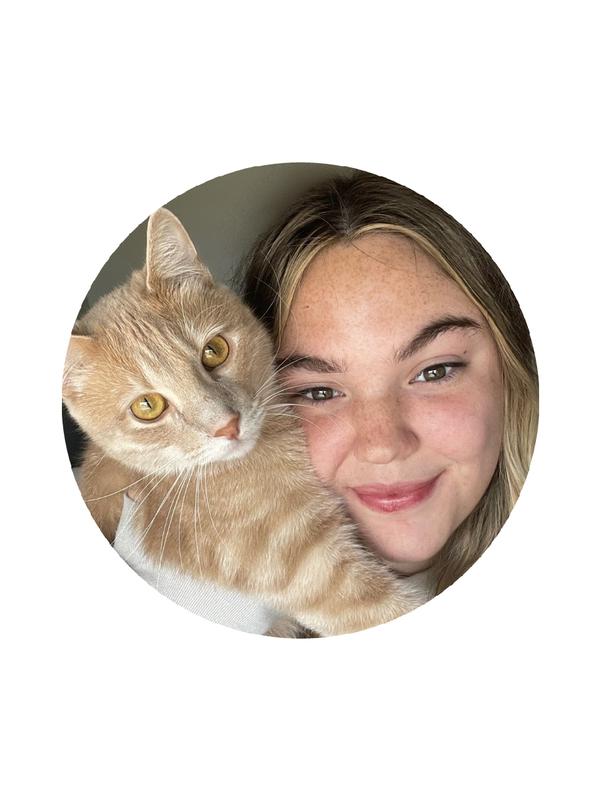by Samantha Joslin
September 28, 2021
Samantha Joslin Samantha is a senior at the University of Kansas, where she pursues a Bachelor’s in English Literature. After graduating, she hopes to use her love of grammar and reading to become a successful manuscript editor. Her hobbies include fantasy writing, portrait photography, and being a servant to her
spoiled cats, Pluto and Mikasa.
Moonlight Rests on My Left Palm: Poems and Essays by Yu Xiuhua (Translated by Fiona Sze-Lorrain); Astra House; 160 pages; $21.00
“But one is never content with endless protection, let alone self-protection,” Yu Xiuhua writes in the first essay of her newly released collection, Moonlight Rests on My Left Palm. “I must find a quick and accessible way to breathe in this bubble.” This statement preempts a paragraph in which Xiuhua casually admits her attraction to women and confesses to shouting fuck you simply to interrupt her friends’ more eloquent conversations. This is the epitome of Yu Xiuhua’s work — drifting between raw philosophical reflection to blunt, even hilarious honesty as casually as discussing the weather.
Moonlight Rests On My Left Palm, comprised of over fifty short poems and eight essays, was initially released in China in 2015 and was received by audiences and critics with intense acclaim. The collection won Yu illustrious literary awards and sold over 300,000 copies, breaking a three-decades long sales record. A documentary about Yu’s life during and after the publication of her work, titled Still Tomorrow, was also released to major critical acclaim.
The documentary follows Yu, a then-forty-year-old woman with Cerebral Palsy, as she navigates being introduced to the world of literary fame, divorcing her unfaithful husband, and handling her mother’s worsening lung cancer. It gives a glimpse into the real flesh-and-blood Yu: in press interviews, she refuses to review the questions in advance; at a panel discussion, she flirts with her fellow panel member. At a bookstore reading, in front of a crowd of strangers, Yu discusses her inability to truly accept her disability and her desire to speak without struggle. When asked if she was worried about being judged for her fearless viral poem "Crossing Half of China To Fuck You," she replies, “I’m a slut. So what?” This is the kind of blunt honesty that bleeds into Yu’s work and imbues it with such unique and alluring rawness.
Xiuhua’s poems are filled with allusions to nature, desire, and heartache that catch at deep and stirring truths about love: “This is how I get through my nights/Tearing flowers into pieces.” Yu’s pain and loneliness bleed through the pages with incredible poignancy as she writes about unrequited love and the binding realities of being physically disabled. Many of her poems explore her relationship with her village, Hengdian — her appreciation for the beauty of the village, her sense of loyalty to the land, her ache to escape. Yu pulls back the curtain on her own human contradictions, confessing love one moment and fury the next, and thus captures exactly what it is to be human, to be lonely, and to be lost.
Many of Xiuhua’s poems use nature symbolically, which leaves her work with a calming, peaceful feel. Her history becomes the roots of a great tree, her sadness becomes a locust tree bare of leaves, poetry becomes streams of flowing water. Xiuhua’s metaphors and similes are often incredibly original, and she uses them to convey specific emotions with precision. Take, for example: “I’ll lie on the floor/and let night drag me around/like a dog who can’t bark.” This line, along with dozens of others, is so powerfully precise that they seem to almost reach out of their ink-and-paper constraints. Xiuhua’s words, so often leaving behind actual logical meaning, threaten to awaken an understanding lying somewhere deep inside, rather than in the boxy logic of our minds: “I loathe that my soul, like moonlight, has yet to be invaded.” These words don’t necessarily connect on a literal level, but make sense in a place just past the blinding all-importance of logic: that is the wonder of Xiuhua.
While most of her poems deal with feelings of heartache and love, her essays are meandering and broad, often exploring many ideas — homesickness, strength, civilization, grief — in passionate streams of consciousness. The longest of these, “My Nostalgia Differs From Yours,” contains a 16-page rumination on the village where Yu was born and raised. “Like our human nature, my village isn’t without its imperfections,” she writes. “I have no desire to cleanse my birthplace of them, just as we humans can’t always defend humanity.” She describes her deeply desolating homesickness caused by the “transformations, helplessness, and victimhood” of her village, which has slowly given way to modernity. Suddenly, like a swift gut-punch, she detaches from her village and describes how it felt to watch her mother be cremated. Just as quickly, she zooms out once more to lament the changing world. All of her essays move this way, in surges of thought and feeling that seem both personal and purposeful.
This is a collection filled with moments of blinding genius, crushing heartache, and playful bluntness. It is an incredibly thought-provoking work that probes at the questions of what it means to be human, to be disabled, and to be home, and with it Yu establishes herself as a poet who will pull back the curtain on herself and her life with fearless abandon.
©2021 West Trade Review
__________________________________________________________________________________________________________________________________________________________________________
__________________________________________________________________________________________________________________________________________________________________________
__________________________________________________________________________________________________________________________________________________________________________
__________________________________________________________________________________________________________________________________________________________________________
__________________________________________________________________________________________________________________________________________________________________________
Love, Nature, and Honesty: Moonlight Rests on My Left Palm by Yu Xiuhua, Translated by Fiona Sze-Lorrain
POETRY REVIEW
Image by Lin2015 on Pixabay
Stay Connected to Our Literary Community. Subscribe to Our Newsletter




